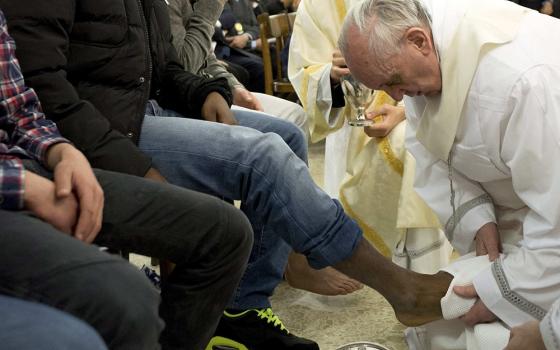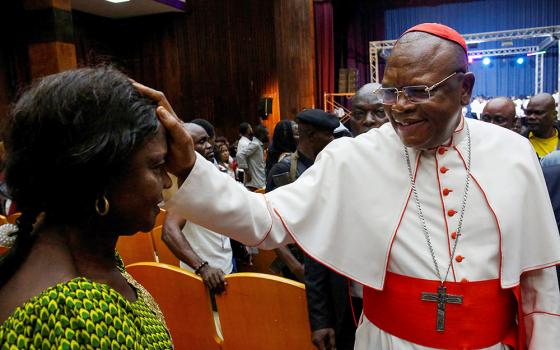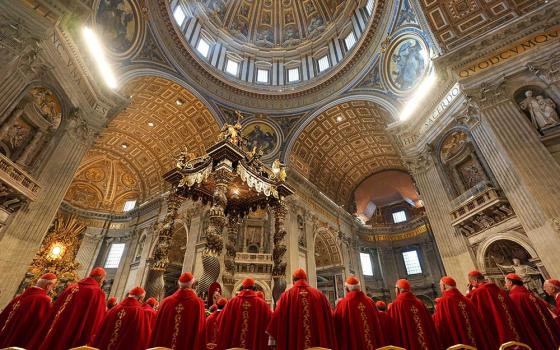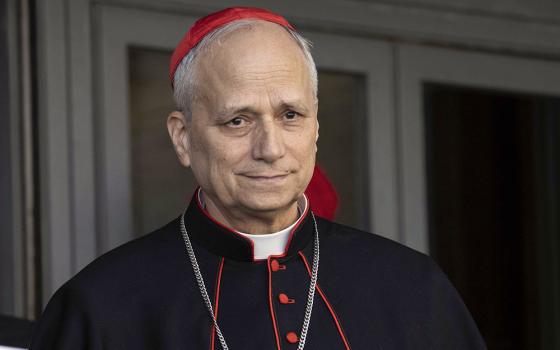Cardinal Beniamino Stella, retired prefect of the Dicastery for Clergy, walks toward the Petriano entrance at the Vatican April 24. Stella, 84, publicly criticized Pope Francis' church reforms, America magazine reported. (CNS/Lola Gomez)
A few in the College of Cardinals are ratcheting up their attacks on the legacy of Pope Francis and debates on the future of the Catholic Church are getting heated, both in closed-door, pre-conclave meetings and in interviews in the worldwide media.
In a dramatic session of the seventh pre-conclave plenary assembly on April 30, Cardinal Beniamino Stella, 84, publicly criticized Pope Francis for what he described as a break with "long-standing tradition" in the Catholic Church, America magazine reported.
Stella is among several Italian cardinals, ineligible to vote because they are over age 80, who in recent days has been outspoken in the media trying to influence cardinal electors to slow the reforms Pope Francis started. Joining the minority chorus of criticism of Francis are conservatives Cardinal Angelo Bagnasco, 82, and Cardinal Camillo Ruini, 94, both former presidents of the Italian conference of bishops.
It is unclear if any of these speeches will affect the overall outcome of the election of the pope. Italian media have reported that Stella is considered to be a backer of former Vatican secretary of state, Italian Cardinal Pietro Parolin.
The news likely will be digested by cardinal electors today, May 1, as they rest and have informal meals; the pre-conclave congregations are not meeting because it is a national holiday, labor day, and the feast of St. Joseph the Worker.
Stella, who grew to be at odds with Francis, accused Francis of "imposing his own ideas" by divorcing church governance from ordination when the late pontiff permitted lay men and women to hold positions of authority in the Roman Curia.
The story about Stella's remarks was reported by the Jesuit-owned America magazine's Vatican correspondent, Gerard O'Connell, a veteran journalist with a solid reputation among the Holy See press corps.
The cardinal who shared Stella's remarks, who was not named by the New York-based America due to the oath of secrecy imposed on the gathering, called Stella's remarks the harshest criticism against Francis voiced during the sessions.
Cardinal Gerhard Müller, former prefect of the then-Congregation for the Doctrine of the Faith, and Cardinal Pietro Parolin, Vatican secretary of state under Pope Francis, listen as members of the assembly of the Synod of Bishops work during the synod Oct. 9, 2023. (CNS/Lola Gomez)
The comments from Stella are also noteworthy because it was Francis who elevated him cardinal in 2014 and appointed him in 2013 as prefect of the Dicastery for Clergy. He left that job in 2021, after he turned 80.
Stella's speech advocating that the church tap the brakes on the progressive reforms of the Francis papacy were even more severe than those of conservative American Cardinal Raymond Burke, an outspoken critic of Francis. Burke's earlier speech was legalistic and doctrine-focused critique, the unnamed cardinal told America.
Stella cannot vote because of his age, so this is the moment where he and other over-80 cardinals can make their argument to younger cardinals who can vote in the conclave .
Another Italian pushing for a course correction is Cardinal Angelo Bagnasco, 82, former archbishop of Genoa. Bagnasco labeled the modernity facing the Catholic Church today "apocalyptic."
In an on-the-record interview with the Italian newspaper Corriere della Sera, Bagnasco launched a tirade against Western culture, which he describes as "a virus" that spreads the emptiness of the soul, sustained by consumerism and driven by "the few" toward a submissive society.
Pope John Paul II laughs while speaking with Italian Cardinal Camillo Ruini aboard a papal flight in 1991. Now 94 and unable to vote in the conclave, Ruini is a leading figure among traditionalist Catholics opposing a new pontiff like Pope Francis. (CNS/Arturo Mari, L'Osservatore Romano)
And then there's Cardinal Ruini.
Also quoted by Corriere della Sera, the nonagenarian cardinal said that the future pope must "give back the church to Catholics."
A leading figure on the traditionalist front, Ruini emphasized what he calls "the Catholic form of the church": doctrine and structure, both of which he believes are under threat.
"The rules do not provide for old preceptors instructing young morons. So this activism that has been going on doesn't have so much reason to exist," Alberto Melloni, a historian of the Italian Catholic Church and a major international expert on conclaves, told the National Catholic Reporter.
Bagnasco and Ruini speaking openly on Italian newspapers and televisions these days, he said, poses "the question of disruptive action versus the patient formation of an agenda for tomorrow."
A source close to the current leadership of the Italian bishops' conference, who spoke to NCR on condition that he not be named, said one or two Italian cardinal electors, at most, are likely to be swayed by the words of Stella, Bagnasco and Ruini.
"Italians over 80 could not be more distant from the three Italian cardinal electors at the center of conversations these days, namely Parolin, Zuppi and Pizzaballa," this person said. "But it is already clear to many that they are part of a church of the past that will struggle to make a breakthrough," the person said.
On another front, the idea of an American pope is gaining traction with Cardinal Robert Prevost emerging as a serious frontrunner, NCR's Christopher White and Rhina Guidos reported. Born in Chicago but shaped by decades of service in Latin America and Europe, the 69-year-old Augustinian friar now heads the Vatican office that oversees bishop appointments worldwide.
His blend of pastoral fieldwork and curial experience has drawn attention, particularly as Cardinal Pietro Parolin’s candidacy falters, according to multiple Italian news outlets today, May 1.
The Corriere della Sera also reported Prevost has been seen on April 30 entering conservative U.S. Cardinal Burke's apartment in Rome to take part in "a top-secret summit."
Advertisement
For Andrea Riccardi, founder of the Community of Sant'Egidio and an expert on Vatican dynamics, the alignments in the conclave this time will not be pigeonholed into the traditional categories of progressives and conservatives.
"They no longer hold up in today's Church," he said. Rather than an ideological divide, the real issue will be deciding whether to stabilize the institution after Francis, or whether to continue along the path of a charismatic and evangelizing pastor.
Conservative Cardinal Gerhard Müller, an outspoken opponent of initiatives in the Francis papacy, returned to speak to the Italian press after already giving two fiery interviews while Pope Francis was still in his open coffin in St. Peter's basilica.
In an interview with Italian daily Il Fatto Quotidiano on May 1, he expressed his desire for a pope free of lobby pressures and not a copy of his predecessor, a pontiff firm in doctrine, capable of resisting what he called cultural and ideological fads such as globalism or gender ideology.
Christopher White and Rhina Guidos contributed to this report.
The National Catholic Reporter's Rome Bureau is made possible in part by the generosity of Joan and Bob McGrath.







